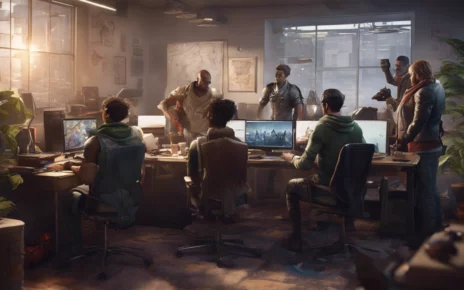Feedback in game development is like oxygen; without it, the creative process suffocates. This critical information—sourced from players, testers, and internal team members—helps developers refine and enhance their games. It’s a collaborative exchange that drives better outcomes.
Types of Feedback in Game Development
Understanding the different types of feedback is vital:
- Direct Feedback: Comes from explicit sources such as player reviews, surveys, and focus groups.
- Indirect Feedback: Gleaned from observing player behavior and analyzing usage data.
- Subjective Feedback: Based on personal opinions and experiences of players.
- Objective Feedback: Involves measurable data like bug reports and performance metrics.
Each type of feedback plays a crucial role at various stages of game development. During the initial concept phase, it helps shape ideas to resonate with the target audience. As development progresses, feedback guides adjustments to gameplay mechanics, narrative elements, and visual design. In the beta phase, the focus shifts to polishing and fixing any remaining issues before launch.
The Evolution of Feedback in Game Development
Historically, feedback in game development was informal and sporadic. Today, online platforms and social media provide developers with a constant stream of player insights, allowing for real-time improvements and iterative updates.
Modern feedback-gathering techniques include:
- Beta Tests and Early Access Releases: Engage players directly.
- Community Forums: Foster discussions and gather opinions.
- Analytics Tools: Track in-game behavior to identify strengths and weaknesses.
This multifaceted approach ensures games are finely tuned to meet player expectations.
Why Player Feedback Is Vital for Engaging Games
Player feedback isn’t just beneficial; it’s transformative. Insights from players shape game features and narratives, enhancing their overall experience. For instance, the game No Man’s Sky faced initial criticism for unmet promises. However, developers took player feedback seriously, issuing updates that significantly improved gameplay, turning it into a redemption story.
Listening to the community helps maintain a balance between complexity and enjoyment. Addressing player concerns—such as difficulty spikes or problematic mechanics—ensures the game remains accessible and engaging.
Games like Fortnite and Minecraft thrive on continuous evolution driven by player feedback, keeping content fresh and the community involved. This collaboration fosters a strong community and creates games that resonate deeply with audiences.
The Importance of Feedback in Game Programming
In game programming, feedback loops are essential for efficiency and quick issue resolution. In agile development processes, feedback serves as a guide for continuous improvement.
Key tools and methodologies include:
- Version Control Systems: Like Git, allowing developers to track changes and revert as needed.
- Code Review Platforms: Facilitate peer feedback.
- Automated Testing Frameworks: Help catch bugs early, streamlining the debugging process.
Real-world examples highlight feedback’s importance, such as the development of Cyberpunk 2077. Despite its rocky launch, ongoing patches driven by user feedback have gradually improved performance and stability.
Enhancing Development Practices Through Feedback
Effective feedback involves measuring and analyzing insights for actionable improvements. Collecting feedback is just the beginning; it must be translated into meaningful changes. Metrics, surveys, and reports break feedback into manageable pieces that developers can act upon.
Creating a feedback-driven culture encourages open communication and continuous learning. Collaboration tools like Slack, JIRA, and Trello can facilitate this integration, ensuring feedback is organized and accessible.
Tracking performance-related feedback is vital for ongoing improvement. Tools like Google Analytics can provide clear insights into player behavior, allowing developers to adjust game mechanics and fix bugs in real time.
Cultivating Feedback as a Core Skill
Feedback isn’t just a process; it’s a skill that developers must cultivate. An open attitude towards feedback fosters a growth mindset, where critiques are seen as opportunities for improvement.
Training and mentoring are essential for building effective feedback skills. Regular workshops, peer review sessions, and feedback-focused meetings help team members hone their ability to give and receive constructive feedback.
Creating a feedback-friendly environment fosters trust and respect, making it easier for team members to express their opinions. This culture benefits the entire development process.
While challenges exist—such as fear of criticism or resistance to change—overcoming these hurdles requires a mindset shift. Viewing feedback as a valuable opportunity helps teams embrace constructive criticism and celebrate improvements.
Conclusion
Embracing feedback as a core skill leads to higher-quality games, stronger teams, and a more efficient development process. By cultivating feedback throughout your game development journey, you create a win-win situation: better games, improved team dynamics, and satisfied players. Stay open to feedback, and watch how it transforms your development experience.




